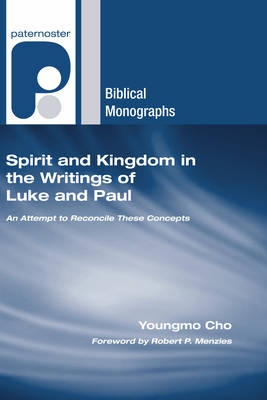
- Retrait gratuit dans votre magasin Club
- 7.000.000 titres dans notre catalogue
- Payer en toute sécurité
- Toujours un magasin près de chez vous
- Retrait gratuit dans votre magasin Club
- 7.000.0000 titres dans notre catalogue
- Payer en toute sécurité
- Toujours un magasin près de chez vous
Description
The relationship between Spirit and Kingdom is a relatively unexplored area in Lukan or Pauline studies. This book offers a fresh perspective of two different biblical writers on the subject. It explores the difference between Luke and Paul's understanding of the Spirit by examining the specific question of the relationship of the concept of the Spirit to the concept of the Kingdom of God in each writer. In constant dialogue with Dunn, Menzies and Turner, this study offers fresh insight into the distinctive understandings of the work of the Holy Spirit in the writings of Luke and Paul by elucidating the relationship of the Spirit to the Kingdom of God in both writers. This is a careful, scholarly work that can be warmly commended to all students of New Testament pneumatology. --I. Howard Marshall, Emeritus Professor of New Testament Exegesis and Honorary Research Professor, University of Aberdeen Youngmo Cho represents a growing and significant group of emerging Asian New Testament scholars. I'm convinced that the next decade will witness a burst of creative theological contributions from this region. They will help us all understand the biblical text and ourselves better. --Robert Menzies, Kunming, China There has been a well-established debate concerning the pneumatologies of the New Testament writers which in recent decades has focused significantly on works by R. P. Menzies, J. D. G. Dunn and M. M. B. Turner. Cho's argument compares Luke's use of Kingdom terminology and Paul's use of Spirit language within the framework of these three diverse 'dialogue' partners. There is an elegant simplicity to the argument which is commendably reinforced by its highly readable presentation. --Andrew D. Clarke, Senior Lecturer in New Testament, University of Aberdeen Asia Youngmo Cho received his BTh from Hansei University (South Korea), his MDiv from Pacific Theological Seminary (Philippines), and a PhD from the University of Aberdeen. He served as a missionary in the Philippines and is currently serving in an Assemblies of God church. He is an assistant professor of New Testament studies at Asia LIFE University, Daejeon, South Korea, and an adjunct lecturer at Oral Roberts University.
Spécifications
Parties prenantes
- Auteur(s) :
- Editeur:
Contenu
- Nombre de pages :
- 254
- Langue:
- Anglais
- Collection :
Caractéristiques
- EAN:
- 9781597527989
- Date de parution :
- 01-01-07
- Format:
- Livre broché
- Format numérique:
- Trade paperback (VS)
- Dimensions :
- 161 mm x 228 mm
- Poids :
- 358 g

Les avis
Nous publions uniquement les avis qui respectent les conditions requises. Consultez nos conditions pour les avis.






